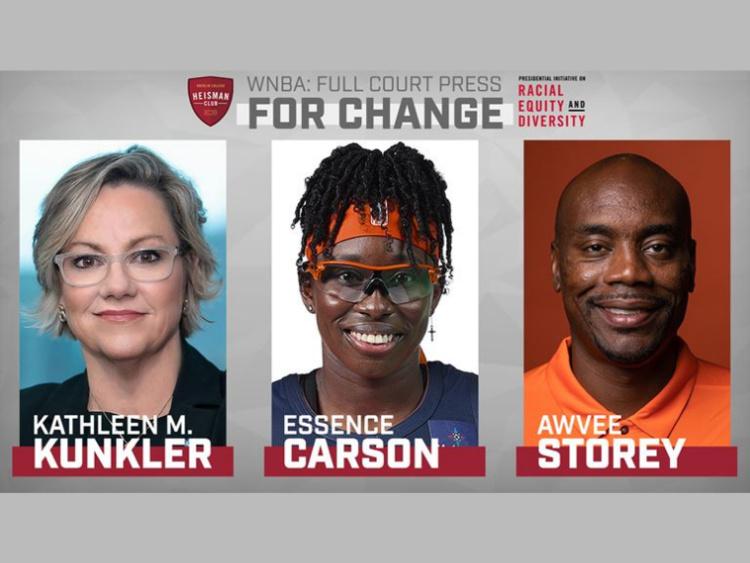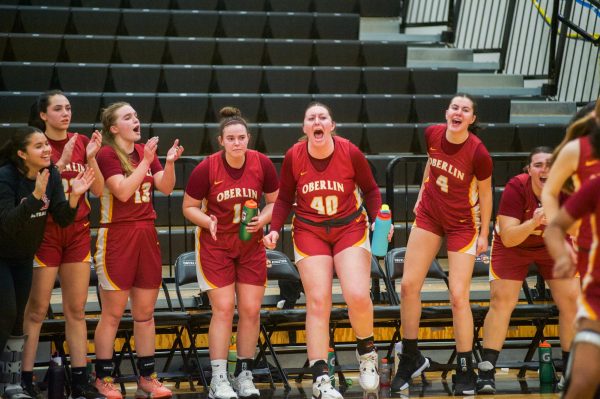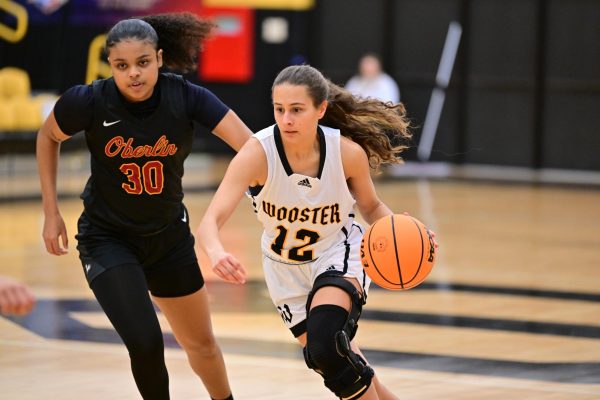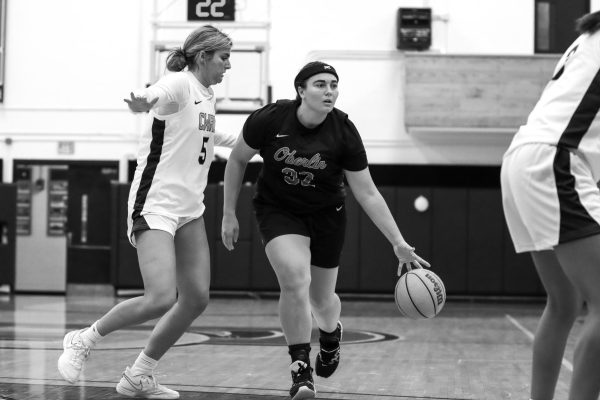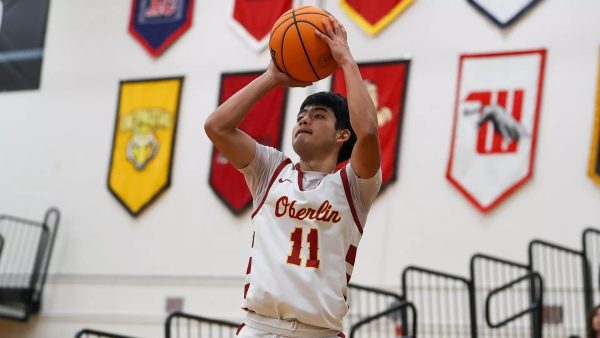Reflections on a Conversation with Essence Carson and Awvee Storey
WNBA: A Full Court Press for Social Change.
In a year that saw activism for racial justice across the national sports community, Oberlin’s Athletics department has been inspired by the impact of professional sports leagues in advocating for meaningful change. On Wednesday, February 17, 2021, to learn from the culture of activism in the WNBA, the Heisman Club of Oberlin College and the Presidential Initiative on Racial Equity and Diversity brought together esteemed guests for the panel “WNBA: A Full Court Press for Social Change.”
Facilitated by Kathleen M. Kunkler, senior vice president and global sports and entertainment director at Morgan Stanley, panelists included Essence Carson, a 13-year WNBA veteran, and Awvee Storey, director of basketball player development of the Connecticut Sun and a former NBA player.
For this week’s panel, Kunkler kicked off the discussion by asking how the WNBA translated the conversations about racial injustices into action. Both Storey and Carson said that the past year was emotional and difficult for them. For Carson, the Black experience has been inspirational, but has also felt like a burden at times.
“Having to navigate through life, trying to understand why certain things happen to your community, and then coming to the conclusion that it has to do with the skin you’re in, and then watching the terrors that are continuously happening to Black and Brown communities, was a tipping point,” Carson said during the panel.
She believes that when there’s a need, you have to meet it — an ethos that informed the creation of the WNBA’s Social Justice Council.
Bringing the panel’s speakers to an Oberlin audience presented a great opportunity for Oberlin’s community to reflect on social inequalities right here at home and come up with creative responses. Many sports leagues spoke out about the racial injustices happening around the country, and among the most active leagues in the social justice movement was the WNBA, announcing the formation of its “Justice Movement” campaign last summer.
Student athletes at Oberlin have been inspired by the impact of professional sports leagues. Oberlin’s Black Student-Athlete Group was initially founded in 2019, but was halted by COVID-19. However, it created the groundwork for current student-athletes to continue this work in spring 2020. BSAG is devoted to creating a tight-knit community for Black student-athletes on campus, as an organization specifically dedicated to promoting them and their successes.
“BSAG is committed to providing a platform for student-athletes who identify as Black to engage in dialogue supporting optimal navigation of Oberlin College’s campus through their shared identity and experiences within Oberlin Athletics. BSAG will assist in the pursuit of academic and athletic excellence, while fostering leadership development, values exploration, and collaboration with campus and community members who place value in their unique journey.”
On the panel panel, Kunkler inquired about a particularly challenging experience when, in 2007, radio personality Don Imus characterized the Rutgers women’s basketball team as “nappy-headed hos” on national television. Rutgers beat the Duke Blue Devils in the NCAA Women’s Basketball Championship game, when Duke missed a free throw, costing them the game.
When this comment was made, Carson explained, she was an introvert and extremely quiet. She describes that her coach, Vivian Stringer, held a press conference after hearing about what had been said and asked Carson to prepare some words to read during the conference. Although Carson was scared, she knew that this was a huge issue, and that she needed to speak on behalf of a lot of people.
“It doesn’t matter that you’re afraid, that’s a normal thing — what matters is what you do to overcome that fear in order to use your voice the way you should,” she said. “Because you’re not only using it for yourself, you’re using it for all the people that aren’t heard, all the people that have been blatantly ignored.”
Storey applauds the players in the league who have put in all the effort to fight for what is right. He said that when he entered his first job as a WNBA coach, he didn’t know what to expect. He realized that it would be a life-changing experience when he started with his first WNBA team, the Washington Mystics.
“Before getting into this space, I was so worried about how I was going to ‘coach women,’ but it really is just the same,” he said.
Storey believes that he is a part of the WNBA community to make change, to put opportunities in front of the women who play the sport that they love.
“The resources that the NBA has that the women don’t have will be changing through me,” he said. “The resources on the men’s side are endless, because the money is there. On the women’s side it’s not the same, but that doesn’t mean the resources shouldn’t be there.”
When asked what advice they would give to BIPOC student-athletes who want to get involved in furthering the social justice movement, both Carson and Storey highlighted the importance of never standing down.
“You are fighting for a better tomorrow,” Carson said. “Not only as a Black athlete, but as a Black person.”
Both Carson and Storey also emphasized that what they are fighting for is not an anti-white movement. They want equality.
During the Q&A segment, one student asked what has made the WNBA such an incubator of activism, especially compared to all the other sports leagues.
“We are a community that has had to fight tooth and nail for every single thing that we get in this league,” Carson said. “Everything we have, it’s rightfully so, and we know that we deserve more.”
When asked what’s next, Carson said she plans on furthering her career in the music industry, as she is a songwriter who plays a wide array of instruments, and seeing how her two different careers will continue to enact change. Storey is excited to continue helping athletes take advantage of what they have to offer and teaching them to put themselves first.
Associate Vice President for Athletics Advancement and Delta Lodge Director of Athletics & Physical Education Natalie Winkelfoos said when closing out the panel that she is “full of gratitude to all those who made this panel possible.” She also made a promise to Carson and Storey that the Athletics department will not let this conversation end.
“There is no better time to be on the right side of humanity than now,” Winkelfoos said.


